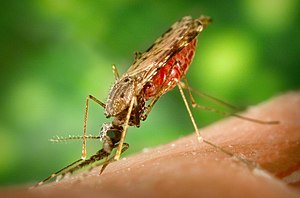 |
| (Photo Wikipedia) |
The news is certainly going to affect our tourism industry, since global health organizations have begun to advise tourists of the potential for contracting malaria in the south of the country. And what's more, they say that the city of Athens may soon be afflicted. Even the US Center for Disease Control and Prevention recently began warning travelers that cases of malaria are being regularly confirmed.
Cases of malaria have been reported in areas of Attica, in the towns of Karditsa, Laconia, Viotia, and Xanthi, while less severe cases were also noted in the cities of Evrotas, Marathon, Markopoulo, and Selino.
According to the Center for Disease Control Malaria is a disease spread through the bite of infected mosquitos. People with malaria often experience fever, chills, and other symptoms similar to the flu. Left untreated, people with malaria may develop severe complications and die. Malaria is a major health problem that causes 350–500 million infections worldwide and about 1 million deaths each year. Malaria occurs in large areas of Africa, Central and South America, parts of the Caribbean, Asia, Eastern Europe, and the South Pacific. From 1999 through 2008, 8,117 cases of travel-associated malaria among US residents were reported to CDC.
Travelers who have symptoms of malaria should seek medical evaluation as soon as possible. Physicians should consider malaria in any patient with a febrile illness who has recently returned from a malaria-endemic country.
How Can Travelers Protect Themselves?
All travelers should take steps to prevent mosquito bites when traveling in Greece. In addition, because of the recent cases of malaria, CDC recommends that travelers to the agricultural areas of Evrotas take prescription medicine to prevent malaria. If you are traveling to the affected areas of Evrotas, talk to your doctor about whether you should take medicine to prevent malaria. Whether you need to take medicine will depend on where you are traveling, the length of your trip, your planned activities, your health history, and other medicines you are taking.
If you are visiting Greece, and want to take preventative measures, then we suggest you follow these simple steps
- Use insect repellent on exposed skin and clothing.
- Use a repellent with DEET, Picaridin, oil of lemon eucalyptus, or IR3535.
- Reapply repellent as directed on the package.
- Follow package directions for using repellent on children.
- Wear protective clothing.
- Protective clothing includes long sleeves, long pants, closed shoes, and hats.
- Tuck in shirts, and tuck pants into socks.
- Wear clothing treated with permethrin for extra protection.
- Protect the area where you are staying.
- Stay in screened or air-conditioned rooms or sleep under a treated bed net.
- Stay indoors during times mosquitoes are most likely to bite, primarily between dusk and dawn.
- http://www.businessinsider.com/now-greeks-are-getting-malaria-as-austerity-bites-2012-10
- http://wwwnc.cdc.gov/travel/notices/outbreak-notice/malaria-greece-sept-2012.htm
- http://www.ibtimes.com/malaria-greece-health-care-cuts-bring-about-outbreak-tropical-disease-851329




